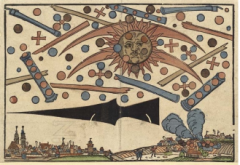An international conference organized by Aura Heydenreich, Florian Klaeger, Klaus Mecke, Dirk Vanderbeke, Jörn Wilms
ELINAS (Center for Literature and Natural Science)
In the Middle Ages and early modernity, celestial observation was frequently a subject for verbal rather than numerical and geometrical recording. Astronomical genres, in the hands of natural philosophers, poets, chroniclers, travelers, geographers, educators and others mediated knowledge of the heavens in textual form. Before the modern academic institutionalization of astronomy, such celestial knowledge extended from the cosmological to the meteorological, with applications and implications that touched upon a wide range of discourses, be they theological, legal, political, medical or agricultural. From Carolingian scholarly commentaries to the lyrical description of the ‘cosmic garden’ in Erasmus Darwin, the formal shape of these representations is intimately connected with the questions raised by astronomy, and the possible answers they might elicit. Such texts could variously function as (mimetic) models of the universe, and simultaneously offer (pragmatic) models for specific types of behaviour. In this, they were deeply enmeshed in their historical, geographical, scholarly, popular, religious, philosophical, and generic environments. For the modern scholar, these records can be difficult to decode, and the question of what they address or seek to explore is obscured by the respective generic traditions, tropics and imagery, and other discursive contexts. However, as tokens of pre- and early modern ‘astroculture’, they allow insight into the changing epistemic place of astronomy throughout the millennium in question. By most accounts, this millennium includes a number of distinct historical periods, and studying the transformation of astronomical knowledge and its representations over the longe durée can shed light on the integrity and utility of such chronological constructs as well as on the transformative processes, the linguistic changes, and the conceptual revaluations that inform them.
This interdisciplinary conference seeks to establish and facilitate a dialogue between literary studies, astronomy (and physics more generally), and the history of science. It includes papers on medieval and early modern ‘literature’ of celestial observation in a broad sense, ranging from what would today be deemed ‘fictional’ to ‘non-fictional’ writings, from scholarly works to popular genres. How, we ask, are textual forms bound up with pre-modern astronomy and its institutions? What kinds of data are represented in these texts and what are the modes in which they are communicated? What interpretational problems arise when present-day disciplines like climatology, meteorology, geophysics, and astronomy, but also literary studies, try to access them, and what solutions might be offered? Which technological and interpretive tools are at our disposal to recover and make sense of astronomical data and references in pre- and early modern texts, and what insights could be gained from an interdisciplinary approach? How were verbal representations of celestial phenomena encoded and self-consciously placed vis-à-vis other systems of representation and knowledge? How were discourses on law, anthropology, aesthetics etc. entangled with astronomical observation and knowledge? How did they realize their own medial, didactic, informational, aesthetic potential? How did they reflect on the forms of knowledge they engaged (especially in terms of the epistemological purchase of ‘observation’ and ‘imagination’)? How was astronomical knowledge used to construct continuities with, or differences from, antiquity and the Judaeo-Christian or Hellenic traditions? Which spatialized conceptions of human nature were recognizable before and immediately after the (alleged) ‘Copernican disillusionment’? How did individual scholars, texts, and concepts travel between European and non-European cultures, both in space and in time, and which constructions of self and other arise in the process?
